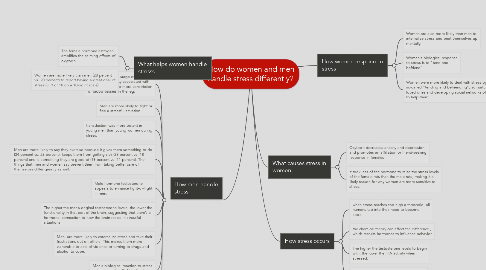How do women and men handle stress differently?
by makenzie morris

1. How men handle stress
1.1. men saw a potent surge of sympathetic activity associated with stress, which led to more constriction of blood vessels in the leg.
1.1.1. ll,,l,l,
1.2. Men are more likely to fight or flee a stressful situation.
1.3. transduction was more potent in young men than young women during stress.
1.4. Men are more likely to say they exercise because it gives them something to do (34 percent vs. 23 percent), keeps them from getting sick (29 percent vs. 18 percent) and is something they are good at (19 percent vs. 11 percent). The things that men and women say prevent them from taking better care of themselves differ greatly as well.
1.5. Male hormone testosterone appears to enhance fight-or-flight in men.
1.6. The higher the men’s original testosterone levels, the lower the functionality in that part of the brain, suggesting that there’s a hormonal connection to how the brain reacts in stressful situations.
1.7. Men, are more likely to externalize stress and take their frustrations out on others. This makes them more vulnerable to acts of violence or turning to drugs and alcohol to cope.
1.8. Men's biological reaction to stress is to go into the flight-or-fight mode.
1.9. Men are more likely to deal with stress head on, to do something about it or, alternatively, ignore it.
2. What helps women handle stresss
2.1. The female hormone estrogen amplifies the calming effects of oxytocin.
2.2. Women are more likely than men (28 percent vs. 20 percent) to report having a great deal of stress (8, 9 or 10 on a 10-point scale).
3. How stress occurs
3.1. when stress reaches too high a threshold, all humans tap into their need to become social.
3.2. the chemical theory can affect the difference , which recruits hormones to influence behavior
3.3. The higher the testosterone levels to begin with, the lower the FFA activity when stressed.
3.4. hormones are the root of the differences in men and women's responses to stress.
4. What causes stress in women
4.1. Oxytocin decreases anxiety and depression, and promotes an affiliation or friend-seeking response in females
4.2. It took less of the hormone to raise the stress levels of the female rats than the male rats, making it a likely reason for why women are more sensitive to stress.
5. How women respond to stress
5.1. Women are also more likely than men to internalize stress and beat themselves up mentally.
5.2. Women's biological response to stress is to "tend and befriend"
5.3. Women were more likely to deal with stress by so-called "tending and befriending", so nurturing their loved ones and developing social networks of people to help them.


